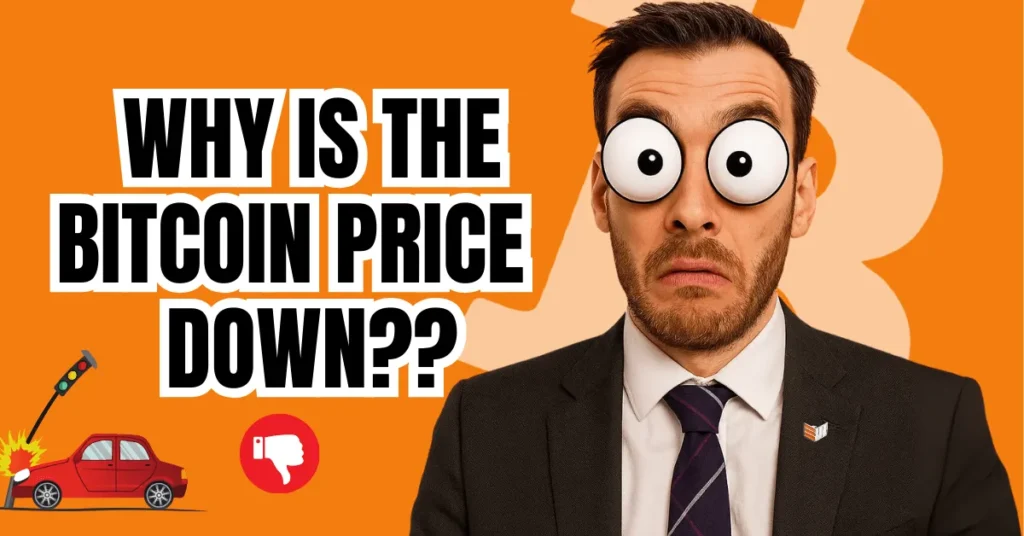I hate it when the bitcoin price falls — like it did this week, first from $118,000 to $115,000, and then $115,000 to $113,000 (and then $112,000 while I was writing; rude). It’s nerve-wrecking, terrifying and straight-up infuriating. We’re on this unavoidable monetary revolution and every identifiable sign is pointing in the same, upward direction — alas, the world won’t cooperate and here we are, looking at an otherwise pretty standard -10%-from-top drawdown.
I get it, it sucks when sways of your net wealth disappear in stomach-churning moves. Advice: don’t ever calculate the dollar amount of what, e.g., the recent -9.2% pullback amounted to for you. Don’t ever look at how many dollars you incinerated in “buying the dip” too early or “catching the knife” while our favorite orange miracle was in free fall.
The Bitcoin Price Didn’t Fall Because Some Talking Head Said Something
On Bitcoin Magazine, like any other financial media involved in click-hungry news, we routinely publish articles about the bitcoin price moving in relation to some macro or political news. It’s not that we, or anybody else, actually believe that price moved on the words of some politician or because Saylor bought more corn or because Metaplanet issued additional stock or because some Hong Kong-based treasury company nobody ever heard of stacked some sats. The bitcoin price didn’t move because the third sentence in Chairman Powell’s latest statement was slightly different than expected.
There’s no sane, rational reason why the bitcoin price ought to hold a certain level (or increase or decrease) because the White House prepares some executive order.
We have plenty of tea leaves readers and technical analysts and macro commentators pitching in, convinced that they know why the bitcoin price moved this way or that. Nobody knows. Bitcoin is too big a macro asset these days to be shoved around by fluff: It moves on the same ethereal and unpredictable changes that move any other asset class — sentiments, liquidity flow, animal spirits, etc.
We publish these bitcoin price articles because you search for them and click on them and read them. You vote with your eyeballs as much as with your dollars. If you want better journalism, be the change you want to see in the world — read the good stuff instead of the fast-food trash with macroeconomic shelf life of a half-eaten apple (the fruit, not $APPL!).
Here’s a decent enough definition of (efficient) financial markets: all market participants’ best guesses of the future state of things, appropriately discounted back to the present.
Everything — including, but certainly not limited to, hot news takes like the Trump Administration issuing executive orders or some treasury company buying more bitcoin or issuing more shares — goes into that aggregation-formulaic statement, and out comes a price shift.
Welcome to financial markets.
You can come at this with technical analysis, and you’d almost never be right; you can make some serious model analysis of liquidity flow or short sellers, etc, and you’ll routinely be proven wrong. No price is beholden to a “psychological limit” of a round number or a 200-day moving average. Price does whatever it does.
All we can do, as good bitcoin price therapists, is deal with it. Buy more, sell some chairs or kidneys, or close the screen and go for a walk. Nobody knows if hyperbitcoinization is here next week or next century, even though it makes a world of difference to your personal finances which one it is.
David Bailey, Chief Executive Chairman of BTC Inc, the owner of Bitcoin Magazine, and the Forrest Gump of Bitcoin, merged his Nakamoto with KindlyMD and finally got to unleash his war chest of almost $700 million to buy bitcoin. He hit the (local?) top, as so many bitcoin-savers have done over the years, and instantly incinerated about $36 million. (The Swedish treasury company H100 — of which I experimentally hold [very little] stock — was even funnier, hitting a 100 BTC+ purchase at almost $121,000; have fun trashing a million dollars.)
Fun times.
Here are some other potentially price-moving things that happened recently:
- Treasury Secretary Bessent said the U.S. wouldn’t buy bitcoin for the strategic bitcoin reserve — and then, for maximum confusion, walked back his words a few hours later.
- Allegedly, Cathie Wood’s Ark 21Shares sold bitcoin recently.
- Macro: speculation about Fed lowering rates in September (or holding them steady).
- The stocks of bitcoin treasury companies, including and especially Strategy, fell like crazy this week too… with suspiciously little activity.
That’s all the therapy you get this week. Go touch some grass and may the sun shine brightly on your face.
The opinions expressed in this article are the author’s alone and do not necessarily reflect the opinions of BTC Inc, BTC Media, Bitcoin Magazine or its staff. The article is provided for informational purposes only and should not be considered financial, legal or professional advice. No material non-public information was used in writing this article. Opinions, and financial actions taken as a consequence of those opinions, are those of the author’s and do not necessarily reflect BTC Inc, BTC Media, or Bitcoin Magazine.
Nakamoto has a marketing partnership with Bitcoin Magazine’s parent company BTC Inc to help build the first global network of Bitcoin treasury companies, where BTC Inc provides certain marketing services to Nakamoto. More information on this can be found here.

